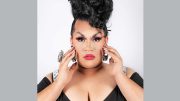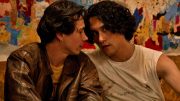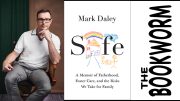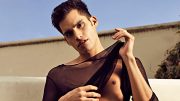By: Chris Azzopardi*/Special to TRT—
During her 15-year career as your friendly pop spirit-lifter, Kelly Clarkson has prescribed a cheap alternative to therapy: anthemic pick-me-ups like “Since U Been Gone” and “People Like Us,” songs that impel a transcendental, fist-raised state.
Late-night Facebook Live sessions are also her thing, and recently, the American Idol alum geeked out like she’d just won Idol all over again about her soulful rebirth, Meaning of Life, released on her new label, Atlantic Records. It was just Clarkson chillin’ on the couch with a glass of red wine that was much deserved, considering the artistic sacrifices she had to make post-Idol, when she felt creatively stagnate as a Top 40 machine for RCA Records. But aside from a fat glass of red, Clarkson has other strong urges too.
Due, in part, to her simply being so damn cool, Clarkson – who drowned the world in their own tears right along with her own as she was crowned the inaugural Idol winner in 2002 – tells me she feels so compelled to stick up for her LGBT besties she literally wants to go door-to-door and talk some sense into her friends’ homophobic parents.
Because her friends ask her not to, she doesn’t. But here, with the ever-outspoken and now-artistically-liberated Clarkson leaving almost no opinion unturned, the Texas native makes that point loud and clear. Before getting back to being a mom to River Rose, 3, and Remington Alexander, 1, as well as husband Brandon Blackstock’s kids Seth and Savannah from a previous relationship, Clarkson spoke like one. Even her simple “diva” request – a “pretty dress to sing in” – is enough to make you wish you were on that couch with her and a bottle of Pinot.
Chris Azzopardi: Mariah, P!NK, Kesha – so many female artists have gone through the creative struggles you have.
Kelly Clarkson: Oh, every artist. It’s so not unique in any way.
Q: How good does it feel to finally be yourself artistically?
A: It just feels freeing to make an entire project and, in its entirety, I’m 100 percent excited about it. There wasn’t any compromise. It’s how I feel the creative industry should feel. There’s nothing like working on something you’re so proud of.
Q: Please tell me you at least got a little sloppy at a gay club to celebrate the end of your contract with RCA.
A: (Laughs) Brother, I got four kids and a career, I ain’t got time to go to clubs! I’m rockin’ a 1-, 3-, 10- and 16 year-old, man. You know what club I go to? The club of playing board games with my family… which, actually, I love.
Q: Plus, you have your farm just outside Nashville. You’ve got chickens to raise!
A: We’ve got our chickens, our honeybees, our orchard. We love our farm.
Q: Have you sent RCA Records head Clive Davis a copy of the album?
A: (Laughs) Be like, “This is what I was wanting to do this whole time!” Yeah, no. (Laughs) You know what’s so sad: I was so excited to work with him. You have no idea. He worked with so many of my favorites: Janis (Joplin), and he worked with Bruce Springsteen way back in the day. All these artists who were very innovative in their time, and I was so excited. That’s been one of the saddest points for me in this industry – just figuring out that someone I really look up to just was not what they seemed. That was a pretty big blow. I was pretty sad about that. Like, we don’t always need to meet our heroes.
Q: In some ways, your story of artistic suppression is relatable to the LGBT community. As an ally, do you recognize that affinity?
A: Talking with my gay or lesbian friends over the years, I can’t imagine. I’ve always said I can’t imagine not being able to be myself in and out. And, yes, while I can relate a bit musically to feeling like you’re going over massive hurdles to try and get to a compromise that you’re happy with, that’s nothing in comparison to hearing my friends talk about (being gay), especially in the South where I grew up, and then the faith thing comes into play.
I had one friend wait, and this is the saddest thing ever: I don’t think she ever felt comfortable in her skin because her parents were older. So, they passed away and then she finally felt free. I thought, “What a horrible feeling to have to wait until people aren’t around to be yourself.” I could never ever relate to that. I feel horrible that anybody has to go through that. It’s almost like when people ask me about other artists who have all these shticks about them and I’m like, “Oh god, that would weigh on me if I had to keep that up, if I had to keep doing shit to make everyone happy.”
Walking onto the stage in, like, a pretty dress to sing, that’s really the extent of my diva, or just my experience on the stage. I’ve always just been very simple. Even in situations, musically, where I really had to fight or jump through hoops, I still was able to be myself, which I think people didn’t like because I was very open. But I have to do that. I have to express myself. Literally, I would go in such a downward spiral of depression if I weren’t able to, and that’s why, honestly, a lot of friends, especially who are gay and lesbian, felt that way. I pray to God my children never have to feel that, that people around me don’t have to feel that. I always hope that I’m always the one person going, “If they’re upset about it, screw it. It’s your life. You can’t not be you. You can’t suffer just because you’re trying to make somebody else happy. That’s not a life.”
Q: That sounds exactly like something Kelly Clarkson would say. And I wonder, as someone who has this large, far-reaching platform, what does it mean to you to be an LGBT ally, and when did you know you had the power to be one?
A: I always laugh at the concept that people are like, “We just love what you say; that’s why we love you,” and I’m like, “Why is everyone not like that?” That’s what boggles my mind. Why would you not say what you want to say? (In our last interview you) asked me if my daughter or son, or any of the four, ended up being gay, how would I take that, and I’d be like, “Awesome!” Honestly, in a world that is so hateful sometimes, I don’t care where my kids find love. Hopefully with a loving and respectful and kind person, but I don’t care if they’re a boy or a girl. It just doesn’t make a damn bit of difference to me.
I do want my children to fall in love with people who are loving, but I feel like our priorities are silly-ass backwards. Like, I want to go to my friends’ parents who just don’t want to talk about it. They know, but are like, “We just can’t talk about it,” which is so demeaning to their (children’s) existence. And I want to knock on their door – I don’t, because (my friends) ask me not to (laughs) – and be like, “Do you know you’re missing out on an exceptional human because you can’t get past your own ignorance? It’s just silly to me that you want to miss out.” I want to tell them, “I didn’t have a dad and it had nothing to do with me being gay – it had to do with, he was a $hitty guy. And you have the opportunity now to _not_ be that parent and embrace your child. That’s your DNA. You love your children. What’s wrong with you?” It just makes me so mad, more so than anything.
Q: This past June, you helped two gay fans get engaged during one of your meet-and-greets.
A: Oh my gosh, it was exciting. But I was nervous! Like, what if he was gonna say no?! (Laughs)
Q: How would you live that down?
A: Literally, before I was like, “Wait. I do not want to be put in this situation where this guy might say no. Are you sure he’s gonna say yes?” And he goes, “Well, I hope so!” He was nervous. I probably didn’t help any. (Laughs)
Q: Do you hope gay couples just start routinely getting engaged in front of you?
A: I was like, “I need to get ordained!”
Q: For the sake of gay couples everywhere, why are you not?
A: I don’t know if that would be authenticated! I don’t know if people would question that! One of our friends – my husband also manages Blake Shelton – was like, “I wanna marry y’all” and I was like, “I want it to be, like, credible. You don’t actually have a following, or a church!
Q: I have a feeling people would go to the Church of KC.
A: Oh, Lord, that would be a funny church.
Q: So, as much as I love talking about music, it’s hard not to acknowledge the screwy state of the world during interviews these days.
A: Yeah, everything is obviously impacted by it.
Q: How are you? I know you’ve always stood up for what you believe in, but in this politically divisive climate, do you feel an even greater responsibility to stand up for the things that are important to you?
A: The hard thing for me, specifically: I always hate when people bring up, “Oh, you’re a celebrity, you shouldn’t have an opinion.” The hard thing in that for me is, I’m not just that. I’m a mother, I’m a daughter, I’m a woman. And it took a long time and a lot of women to pioneer that way for me, to even have a voice. So, for me to not use that is so disrespectful to those before me who worked so hard for it. For me to not take advantage of that seems like a cruel irony.
Why would I not voice my opinion as a mother? Why can’t I say this is a really hard time to have a 10- and 16-year-old, guys? Because I don’t know what to tell them when they hear certain things on TV. They’re smart enough to know what’s going on. I can’t hide them from that. So, it’s a very hard time to explain things away. It’s a very hard time to have the discussion about any kind of bigotry or racism or elitism. It’s a very hard time because a lot of things are happening that are making crazy, insane, irrational moments normal, and it’s a very hard time to raise kids in that environment. Forget me even being a celebrity. As a mother – just as a mother – it’s a very hard time.
I’m glad, at least, that everything is all coming to the forefront because it’s now pointing out – like, I had no idea we had white supremacists. I have never come across people like that. Not even as a child in a small town in the South, and even then, that town has blossomed and they’re more progressive now.
It’s 2017 – why are we still having these conversations? But we’re having them because they do exist, and it’s insane. It’s insane that somebody just doesn’t go, “Oh, I’m sorry, but yeah, we don’t want that here. You should go somewhere else. This is a country of many cultures, many faiths, and open-mindedness. That is why people came here.” It’s amazing to me that we just don’t have grown-ass men and women in the public eye of politics going, “Absolutely not. I’m not even having this conversation because that’s not even OK. There’s no way to validate what just happened.”
Q: Reflecting on all your work for RCA: Which album are you most and least proud of?
A: The album I’m most proud of in that whole section is the Christmas album (2013’s Wrapped in Red), and that’s just because it was 100 percent me. Because it was Christmas and it was OK for me to make decisions (laughs). They let (producer) Greg (Kurstin) and I do whatever we wanted, so it was a lot easier to accomplish my goal with that album.
My least favorite? Man, I mean, maybe my least favorite was my first one (2003’s Thankful). I just say that because of the experience. I was very young and very excited about making a record. It was my first time doing all of that, and it was also my first time realizing, “This is gonna be really hard because there are so many cooks in the kitchen and they don’t care that you’re not allowed to be one.” It was my first experience in the industry going, “Oh, wait, this isn’t what I thought it was gonna be like.” So my ignorance led to that and me being young and excited, I guess. Not that I don’t love the album – it’s just that I didn’t love finding that out.
Q: Do you ever get tired of singing your first single, 2002’s “A Moment Like This”?
A: I never sing it! Because the song wasn’t meant for me – it was meant for the winner. I never would’ve been like, “This is a great record” (laughs). I get the moment it was for. That was the perfect song for that moment. I totally address that, but that song doesn’t fit in my tour setlist.
Q: It still takes me back every time I hear it.
A: Totally. The nostalgia. For me too. It was a beautiful moment. I’m very thankful and blessed for it. But it wasn’t a song that was meant for me. They just wrote it for whomever was gonna win, so that doesn’t make me feel special. (Laughs)
Q: With Meaning of Life, your hair on the album cover is giving me some serious Mariah vibes.
A: That Drew Barrymore-to-the-side-’90s vibe, yeah – it’s completely calculated. (Laughs) I literally was like, “I want the hair for this album to be talking to God.” It fits with the record. It’s so sassy and confident and diva in the best sense, and so I really wanted that ’90s hair. All my inspiration photos were of ’90s hair. Whether it’s the artwork or the music, everything on this album is influenced by the ’90s, which was my favorite time in music.
Q: From “Since U Been Gone” on through “People Like Us” and “I Have a Dream,” your anthems have been empowering to LGBT people. What song on this album do you hope becomes the next big gay anthem?
A: It’s always my gay boys who come up and go, “Oh my god, I love ‘Whole Lotta Woman.’” And it’s so funny, because I’m like, that is so ironic and amazing! (Laughs)
Q: Based solely on the track’s name, not even the fact that it’s a celebratory anthem, you can’t possibly be that surprised.
A: (Laughs) Honestly, I didn’t think about it! But then we performed it impromptu at the Today show just for the audience there in New York – not for the televised show, just for the audience – and it was so funny because all the gay boys were dancing more than anyone, even more than the women! It was so fun. It’s such a fun audience that just loves sass and confidence, and I just love being surrounded by an audience with that kind of energy.
Q: That song definitely shut downs, once and for all, your social-media shamers. What advice do you have for LGBT people who experience the bullying that you’ve experienced?
A: We have a 16-year-old girl and a grown-ass woman was being horrible to her. She was just being hateful and passive-aggressive online and I had to be real with (my daughter). I said, “This is gonna happen so often, so this would be a good time to learn to take the high road. Block them or whatever you want to do to not see it, if you don’t want to see it.”
Bullying is gonna happen, so we tell our kids, “That’s gonna happen. I can’t protect you from that. There’s nothing we can do about that. There are no bullying cops.” It’s an epidemic that’s horrible and it needs to be addressed, but at the same time, when you have kids coming to you, I just have to teach her to rise above it.
It’s one of those things I always describe to fans, too, in meet-and-greets because they always ask, “How are you so confident?” It’s because, at the end of the day, I really don’t care about anyone’s opinion but mine and the people I know who love me and really do want the best for me. You can’t base your entire existence and every decision off how people are gonna feel about it. That’s a giant check list; there’s a lot of us. (Laughs) So, just be happy with your decisions, and sometimes know you’re gonna be successful and sometimes you’re gonna fail. And whatever. At least you were steering your ship.
*As editor of Q Syndicate, the international LGBTQ wire service, Chris Azzopardi has interviewed a multitude of superstars, including Meryl Streep, Mariah Carey and Beyoncé. Reach him via his website at www.chris-azzopardi.com and on Twitter (@chrisazzopardi).







